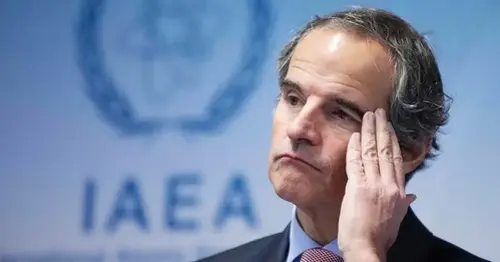
Tons of uranium have gone missing from Libya, raising nuclear security fears
Around 2.5 tons of natural uranium have gone missing from a site in war-torn Libya, the United Nations nuclear watchdog has revealed, raising security and safety fears.
The International Atomic Energy Agency (IAEA) said in a statement that its director general, General Rafael Mariano Grossi, had informed member states about the missing uranium on Wednesday.
During an inspection carried out Tuesday, “agency safeguards inspectors found that 10 drums containing approximately 2.5 tons of natural uranium in the form of uranium ore concentrate were not present as previously declared at a location in the State of Libya,” the statement said.
The Vienna-based agency added that it was carrying out “further activities” to “clarify the circumstances of the removal of the nuclear material and its current location."
Natural uranium can’t immediately be used for energy production or bomb fuel, but — if obtained by a group with the technological means and resources — it could be refined to weapons-grade material over time and may also carry radiological risks in the event of prolonged exposure, experts say.
That makes finding the missing uranium a priority.
“The loss of so much uranium oxide, commonly known as yellowcake, is a huge concern, though it is not highly radioactive," said Hamish de Bretton-Gordon, a former commander of the United Kingdom’s and NATO’s chemical, biological and nuclear defense forces.
De Bretton-Gordon told NBC News that the uranium was "likely in powder form," and would need to be handled by people wearing hazmat suits and respirators.
"Ultimately this uranium could be enriched for nuclear power purposes to around 20% or nuclear weapons grade to around 90%, but this is not a trivial process and would need a highly advanced processing system to do this," he added. "However, we know that Iran and North Korea are working hard at this."
"This is not ideal materiel for a dirty bomb," de Botten-Gordon said, referring to a bomb augmented with a radioactive material, "but it could be used to spread low level contamination over a wide area. We know both Russia and ISIS have discussed dirty bombs recently."
Russia claimed last year that Ukraine planned to deploy a so-called dirty bomb, but provided no evidence. Fears of such a device being deployed by extremist groups have also persisted.
With sophisticated security and policing systems in place, de Bretton-Gordon said it was unlikely the nuclear material would be used for "nefarious reasons."
Reuters first reported on the IAEA warning about the missing Libyan uranium.
In 2003 Libya under then-leader Moammar Gadhafi renounced its nuclear weapons program, which had obtained centrifuges that can enrich uranium as well as design information for a nuclear bomb, though it made little progress toward a bomb.
Libya has had little peace since a 2011 NATO-backed uprising that ousted him.
Since 2014, political control has been split between rival eastern and western factions, with the last major bout of conflict ending in 2020.
Source: https://www.nbcnews.com/news/world/tons-uranium-missing-libya-nuclear-fears-un-watchdog-rcna75218






